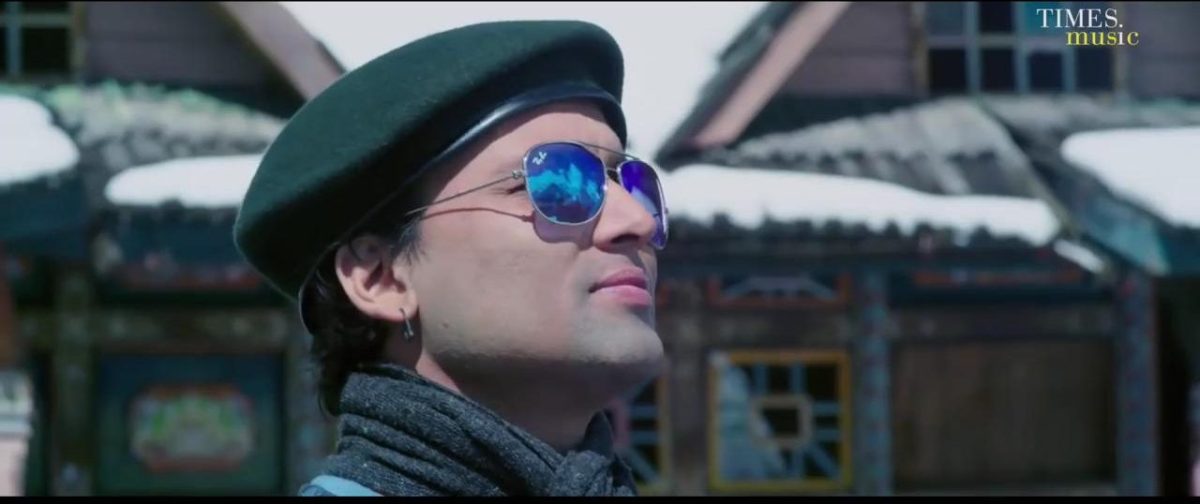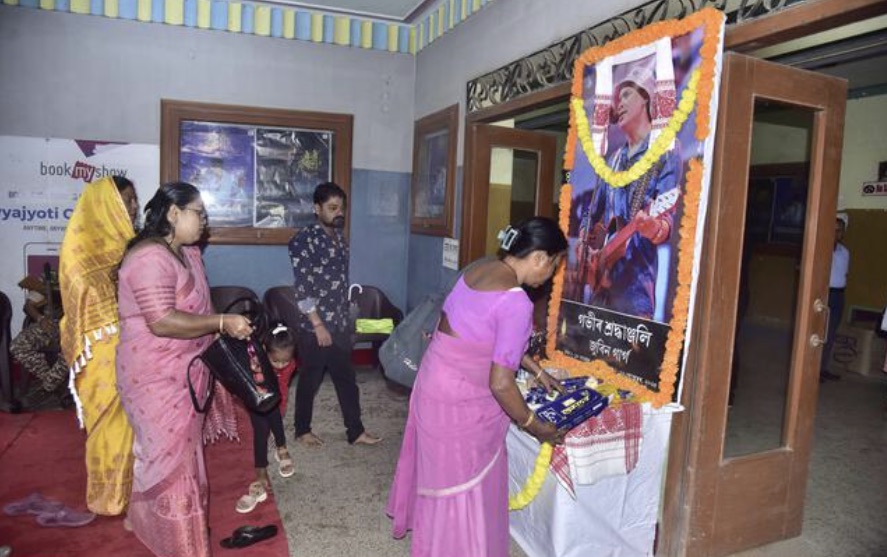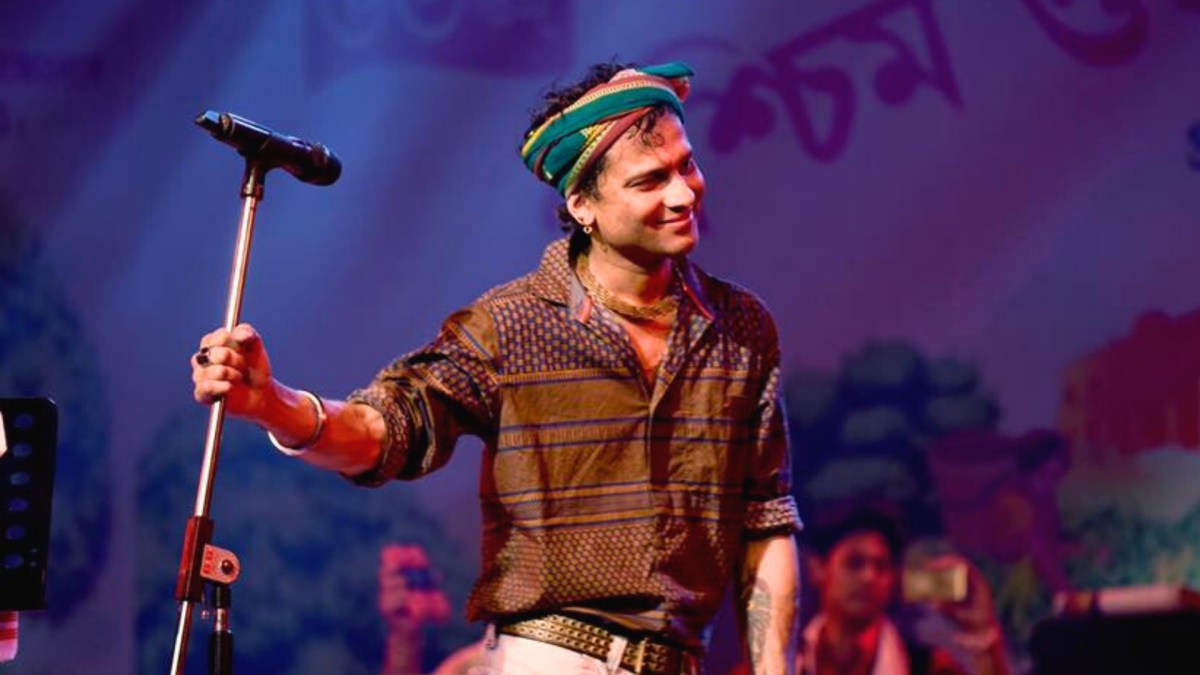Assamese cinema’s vitality has long been tied to Zubeen Garg’s singular energy. Zubeen has been a part of every defining moment in Assamese cinema since his debut in the world of music. In 1998, he sang for “Joubone Amoni Kore.” Later, he composed music for “Hiya Diya Niya” (2000), acted in National Award-winning films such as “Dinabandhu” (2004) and “Mon Jai” (2008), made a cameo song appearance in “Raamdhenu” (2011), and went on to direct “Mission China” (2017). Today, his unfortunate death has marked yet another defining moment for Assamese cinema as “Roi Roi Binale” breaks all kinds of box-office records in Assam.
All of the films mentioned above are landmark films in the history of Assamese cinema, and Zubeen was an entire industry in himself – a songwriter, singer, composer, actor, producer, director, and a complete brand who could pull audiences into the theatres just with his name. “Roi Roi Binale” is a well-made film that is technically impressive and visually stylish.
For the first time, an anamorphic lens has been used to shoot an Assamese film, and when viewed in a cinema hall with good screening technology, the colours and the image quality come out vividly imaginative. The visual aesthetics at play and the overall musical treatment make the film on par with high-budget Bollywood productions.
But people are not watching the film for entertainment or any assessment of quality. They are watching it to make sense of their loss and to feel the visual warmth of being in the grace of someone they adored. In fact, people are watching “Roi Roi Binale” not as a film but to celebrate Zubeen Garg one last time. In this celebration, they also mourned and cried as the tribute video at the end of the film filled the screens.
As the hall grew dark, chants like ‘Joi Zubeen Da’ and ‘Zubeen Da Amar Houk’ (Long Live Zubeen Da) filled the air as the audience made their way out of the theatre. Such was the impact. And with the same public frenzy seen days after the release, only one question comes to our mind – how can someone love an artist so deeply? How can someone mourn his death so intensely?
Public Response and Pre-Booking Records
The public response to “Roi Roi Binale” since its release on October 31 has been humongous, tremendous, and magnanimous. In fact, any lofty adjective used to describe the situation would still fall short. “Roi Roi Binale” is the first Assamese movie to have early morning shows in Assam. Screenings began as early as 4:25 AM at Matrix Cinema, Beltola, Guwahati, and 4:35 AM at Nakshatra Cinema, Lakhimpur, and 4:45 AM at RR Cinemas, Dhemaji.
It was followed by Tezpur with a 5:00 AM show at TNZ Cinemas, a 5:20 AM show at IMP Cinemas, and a 5:45 AM show at SVF Cinemas. In other parts of Assam, screenings began from 6:00 AM and 7:00 AM, with the last show at 11:55 PM. The most interesting thing of all, each and every show went housefull with tickets sold out for a week in advance. Double the excitement was also found among the members of the Zubeen Garg fan clubs as they came out in large numbers to paste posters of the film at key locations across towns and cities.
As cinema halls in Assam competed with each other as to who could host the first screening of the film, “Roi Roi Binale” also became the first Assamese film to be released in Aizawl, Mirozam, which is among the 46 cities of India where the film was released. Apart from that, it was also released in places like Jaipur, Ranchi, Dhanbad, and Goa, where Assamese films are rarely released. It was also screened with a record-breaking number of 18 shows across 14 cinema halls in Mumbai, 77 shows across 15 cinema halls in Bengaluru, and 12 shows across 10 cinema halls in Kolkata.

In Guwahati, which hosts the maximum number of cinema halls in Assam, PVR Cinemas, City Centre Mall led the numbers with a record of 28 shows in a single day. It was followed by Cinepolis, Centrall Mall with 24 shows, and Inox, Aurus Mall with 23 shows. And it is the same Cinepolis that had earlier denied the premiere of Garg’s “Mission China” in 2017. Considering other cinema halls of Guwahati, the total number of shows for Day 1 went above 150. So, this is the first time such a craze for a film was witnessed by the 14 cinema halls currently functioning in Guwahati. A few more cinema halls like Kelvin Gold are coming soon in the city.
The Day of Release – History for Assamese Cinema
On October 31, the people of Assam paid no heed to the light drizzle in the morning as they made their way to the theatres. Meanwhile, the cinema halls offered their tributes and services wholeheartedly to Zubeen Garg. A special seat in the auditorium was reserved for Zubeen Garg in many cinema halls. Moreover, huge cutouts of the rockstar, ordered by theatre owners, stood tall at the entrances. People gathered around them and clicked photos to keep a memory of their beloved star. Shraddhajali ceremonies were also held as people lit earthen lamps before Zubeen’s photograph, placed in dedicated spaces inside every hall.
Some cinema halls also offered light refreshments to their patrons. In many places, such as Moran, special shows were arranged by various organizations for people with physical disabilities, residents of old age homes, and orphaned children. In Golaghat, a man in his fifties rode a bicycle for 45 kilometers to watch a screening of the film on the first day. And hence, children, the youth, the old, and everyone came together to watch the film and left the theatre with moist eyes as the emotional tribute at the end of the movie moved them beyond their emotional restraint.
Glitches and Grievances
According to various news reports, an audience member had to be rushed for medical assistance as they broke down emotionally at Bhaskarjyoti Cinema Hall in Sivasagar. Arun Garg, a close associate of the late singer Zubeen Garg, also fell ill at Eleye Cinema Hall in Jorhat. Meanwhile, in Bongaigaon, a theatre named Jolly Max faced public backlash when a technical problem in one of its two screens led to the suspension of the film’s screening. The hall authorities quickly rearranged the people into makeshift seating accommodations in the other auditorium.
Meanwhile, at Nalbari’s Bella Luna Cinema Hall, the authorities confiscated mobile phones from the overenthusiastic audiences to prevent unauthorised recording of the film. Moreover, as seen in a viral social media video, technical glitches during a screening of the film at a Cinepolis cinema hall in Bengaluru also resulted in heated exchanges among fans and the theatre staff.
Among such minor incidents, there is some positive news as well. In many cinema halls across Assam, people sang “Mayabini” like an anthem before the movie began. In Bishnu Talkies, Dhubri, an Assamese cinema, got the successful housefull tag after 30 years. Such was the craze of the movie in its first weekend, which is continuing in many theatres.
Later, Universal Cinema, Bongaigaon, also faced some technical problems, due to which shows were being cancelled. In many places, FIRs are now being registered against individuals who have recorded the movie and shared unauthorized clips on social media—something Zubeen Garg had strongly opposed. A voluntary anti-piracy team has also been formed to monitor and prevent these uploads. Hence, despite repeated requests from fans, the film’s team and the media, such incidents continue to take place, which is not a positive sign for Assamese cinema.
Safety and Security of Patrons and Staff

But one aspect that has not received enough attention during the screenings is the safety and security of the audiences, the working staff of the halls who are operating round the clock, as well as the projectionists. It is also important to give the costly and important cinema hall equipment, like the projectors and the sound systems, a break. Amidst that, positive reports have come from Galaxy Cinema Hall in Diphu, where CRPF jawans were seen on duty outside the hall hosting houseful shows of the movie. The jawans have noted that it was their first time managing the security for a movie. A similar setup was also seen outside Divyajyoti Cinema Hall at Nagaon.
Opening of New and Old Cinema Halls
Many cinema halls across the state have newly opened, just in time for the movie, some of which were supposed to be inaugurated by Zubeen Garg himself. An upcoming Chhotu Maharaj cinema hall in Duliajan is one such example, which is now set to open on November 18, coinciding with Garg’s birthday. In Guwahati, the upcoming Kelvin Gold cinema hall hosted a special private screening of the film with the cast and crew after its release. Kelvin Gold is also aiming to open to the public in the month of November.
Along with these, some old cinema halls of the state have also re-opened, and some are on the way to re-open, like the Jeuti Cinema hall in Simaluguri. But re-opening a closed cinema hall is an easier said than done task. Ganesh Talkies in Jagiroad, which, despite much publicity, is still unable to screen the film because it is not yet able to meet certain technical requirements. The hall had closed seven to eight years ago. Recently, filmmaker Manas Barua, sound designer Amrit Pritam, and producer Shyamantak Gautam visited the hall to assess the situation and explore ways to help reopen it. They have assured the public that the hall will reopen soon.
The Economics behind the Hype
Also, the hype machinery set around “Roi Roi Binale” is not entirely emotional because there are various economic leverages associated with it. National multiplex chains like PVR Inox, NY Cinemas (now Devgn Cinex), etc, have cancelled all the Hindi and English releases like “Good Boy,” “Black Phone 2,” “The Taj Story,” “Bahubali: The Epic,” or Shah Rukh Khan film festival, etc, merely to ride on the Zubeen Garg wave in Assam. They know demand when they see it.
So, it’s not Assamese cinema defeating Bollywood or Hollywood at the moment because those films, if released under normal circumstances, would not have resulted in higher footfalls than “Roi Roi Binale.” And the time that we are witnessing today is not normal. So, why would they let go of such a special circumstance to mint money?
The situation would have actually called for a celebration if a major high-budget Bollywood movie had been released alongside “Roi Roi Binale,” and the theatres would have then chosen to sacrifice that, all the while Zubeen Garg was alive and well. Previously, the national multiplex chains also notoriously hiked their ticket prices, seeing the demand for “Roi Roi Binale,” before the public called them out. But among these, it is also satisfying for many to see the re-release, “Baahubali – The Epic,” go down before an Assamese film because earlier it was “Baahubali 2: The Conclusion” (2017), which pulled down Kenny Basumatary’s “Local Kung Fu 2” (2017) from the theatres in Assam.
Also Read: How Did Zubeen Garg Become the Heartbeat of Our Generation
Like many people have already said, it is true that we are currently witnessing history. Assamese cinema has never been stronger, and yet, it might never be this strong again, because right now it is being powered by grief, or more particularly, a hype triggered by grief that cannot be repeated. There have been films like “Bidurbhai” in the immediate past, which had no direct Zubeen Garg connection, or films like “Priyaar Priyo” and “Sikaar,” which didn’t perform as expected from a Zubeen Garg starrer, but the multiple dependency of Assamese cinema on this single cultural figure also reveals the shortcomings of the Assamese film industry.
The Major Shortcomings of the Assamese Film Industry
A major shortcoming of the Assamese film industry is the insufficient number of cinema halls in the state, especially in the rural towns and suburbs. Zubeen Garg, while alive, was always vocal about this issue and actively worked to reopen closed cinema halls. Today, this shortage is evident again, as people must travel long distances to watch Zubeen Garg for the last time.
From Nagaon to Jorhat, there is not a single cinema hall along the stretch; similarly, from Biswanath Chariali to Bihpuria, there is no cinema hall in between. The world’s largest river island, Majuli, has no immediate means of accessing cinema on the big screen, forcing residents to cross the Brahmaputra and travel to Jorhat, Dibrugarh, or Lakhimpur. Other places like Namrup and Naharkatiya also lack cinema halls.
On the positive side, to address such deficits, some screenings are being arranged in makeshift setups with temporary screens and projectors—for instance, a special screening of “Roi Roi Binale” is being planned at Ganesh Gogoi Auditorium in Dhakuakhana for neighboring areas like Majuli. In many places, such as Tangla, specially booked buses have brought groups of people from neighbouring villages to watch the film at Saya Cinema.
Additionally, several upcoming cinema halls are nearly ready to open in places like Nagaon town, Chabua, Duliajan, etc., which is a promising development for Assamese cinema. If alive, Zubeen Garg would have done even more to promote the development of cinema and cinema halls in Assam.
The Politics of Spectacle
The benefit of Zubeen Garg’s absence is now best turned into a politics of spectacle by the various representatives of the public. From Himanta Biswa Sharma to Akhil Gogoi to Gaurav Gogoi, no one is leaving out on an opportunity to perform. The AGP leaders, including Atul Bora and Keshab Mahanta, watched the film at Gold Cinemas, Narengi in Guwahati. Dulu Ahmed arranged for a special screening of the film for children and residents of the old age home at Guwahati’s NY Cinemas on the first day.
In response to AJP leader Lurinjyoti Gogoi’s query, noting that the Himanta Biswa Sarma government gave state employees a half-day leave to watch “The Kashmir Files” (2022) but is indifferent to Garg’s film, CM Himanta Biswa Sarma said that he’ll watch it later at Tezpur’s Jonaki Hall, as his presence might cause security issues and inconvenience to the public. Meanwhile, many pointed out that the Jonaki Hall in Tezpur, Assam’s first cinema hall, has been lying defunct and in ruins for years. There were steps taken by the Assam State Film (Finance and Development) Corporation, but till now, it has not materialized.

Again, as reported, Sarma later said that he’d watch the film at a later date to avoid politicizing the event, adding that “first comes the people, then the king,” implying that he would go after the public, as Zubeen’s legacy belongs to the people. This particular comment has made several people upset because of Sarma self-referencing himself as the ‘king’.
In other news, Sarbananda Sonowal, Ranoj Pegu, Phani Bhusan Choudhury, Rupjyoti Kurmi, and many other ministers and MLAs watched the film over the weekend and the week that followed. Some also arranged for free screenings for the people of their constituencies. And with the next Assam Elections just around the corner, such actions and support for a movie have naturally made the public question their motives. Many claim that Zubeen Garg and “Roi Roi Binale” have now become a means for some politicians to strengthen their public presence and impress their electorate.
Future of Assamese Film Industry
The death of Zubeen Garg and his film “Roi Roi Binale” has brought in many layers to decode for the future of the Assamese film industry. One such aspect is that of the growth of film journalism in the region. Reporting on cinema in Assam faces significant challenges, particularly when it comes to providing accurate and verifiable information about local films. Details such as budgets and box office collections are often inconsistent or unavailable from the local media.
As a result, they are seen citing national media websites like Koimoi or Bollywood Hungama for such figures, which also have unverified and unclear sources. For instance, the budget of “Roi Roi Binale” is reported variously as ₹4 crore by some and ₹5 crore by others. Similarly, reports about the first-day collection are presented in the same unverified way, ranging from ₹1.85 crore to ₹4 crore, with the official figure later stating it as ₹2.52 crore.
The lack of a centralized, reliable reporting system on box-office collections, combined with the regional media’s collective disinterest in film journalism, contributes to such a poor state of film reporting in Assam. Moreover, producers often withhold the actual figures, and sometimes different representatives from the same film provide contradictory numbers. Meanwhile, films that underperform are sometimes promoted with inflated figures on social media. These practices hinder accurate analysis and understanding of the Assamese film industry, which impacts its growth.
As reported by the producers, the first-day collections of “Roi Roi Binale” have emerged to be around ₹2.50 crore. Considering the pre-bookings and the continuing hype, the film is expected to run for about two more months and could easily earn between ₹20–30 crore in its theatrical lifetime. The producers have also officially announced that they will not release box office numbers immediately and will share the statistics only collectively after a month. This was done in respect of the singer, as it is not the time to discuss the figures while the whole of Assam awaits justice.
The danger of such an overwhelmingly enthusiastic response is that watching “Roi Roi Binale” has now become like scaling Mount Everest. You climb to the highest possible point, emotionally, commercially, symbolically, and there’s nowhere left to go. When every cinema hall, every news headline, and every politician aligns for one film, what happens when the next local release doesn’t carry a myth attached? Will the audience stay awake, or go back to sleep? That is the biggest question associated with the Assamese film industry now.
Zubeen Garg’s Vision as a Producer
Zubeen Garg might not have been a filmmaker known for exceptional directorial skills, but he understood the game of marketing and effectively used his star power and fan following to yield the best results. He focused very much on the publicity and marketing of his films to make them successful. He travelled far and wide and spent lavishly to promote his films.
His “Mission China” was also promoted in several locations of Meghalaya, including Shillong. He also recognized the importance of standard and quality in cinema, whether it be music, production value, or art direction, with the latter two receiving almost negligible importance in Assamese cinema. This is why his films always stood apart in terms of visual quality and songs.
So, the direct signal for the revival of the Assamese film industry is the proper marketing and publicity of films and the upgradation of their visual quality. The success of recent big-budget films in Assam, like “Bidurbhai” and “Bhaimon Da,” also highlights an X factor that is necessary for a film to succeed in the region. In Zubeen Garg’s films, that X factor was Garg himself. Thus, if a filmmaker cannot provide an X factor to draw audiences, it may be better not to make the film or release it commercially.
So perhaps Roi Roi Binale’s greatest legacy won’t be its box office collections or the record-breaking shows. Its legacy might be about how it reveals the anatomy of commercial business for Assamese cinema – the concerns, the passion, the market forces, and the fan hysteria. In that sense, “Roi Roi Binale” is both a farewell to Zubeen Garg and also a mirror to Assamese producers and filmmakers.





![Unplugging [2022] Review: A Relatable Comedy about Digital Detox that Shines Through All Odds](https://79468c92.delivery.rocketcdn.me/wp-content/uploads/2022/04/Unplugging-Movie-Review-1-768x311.png)
